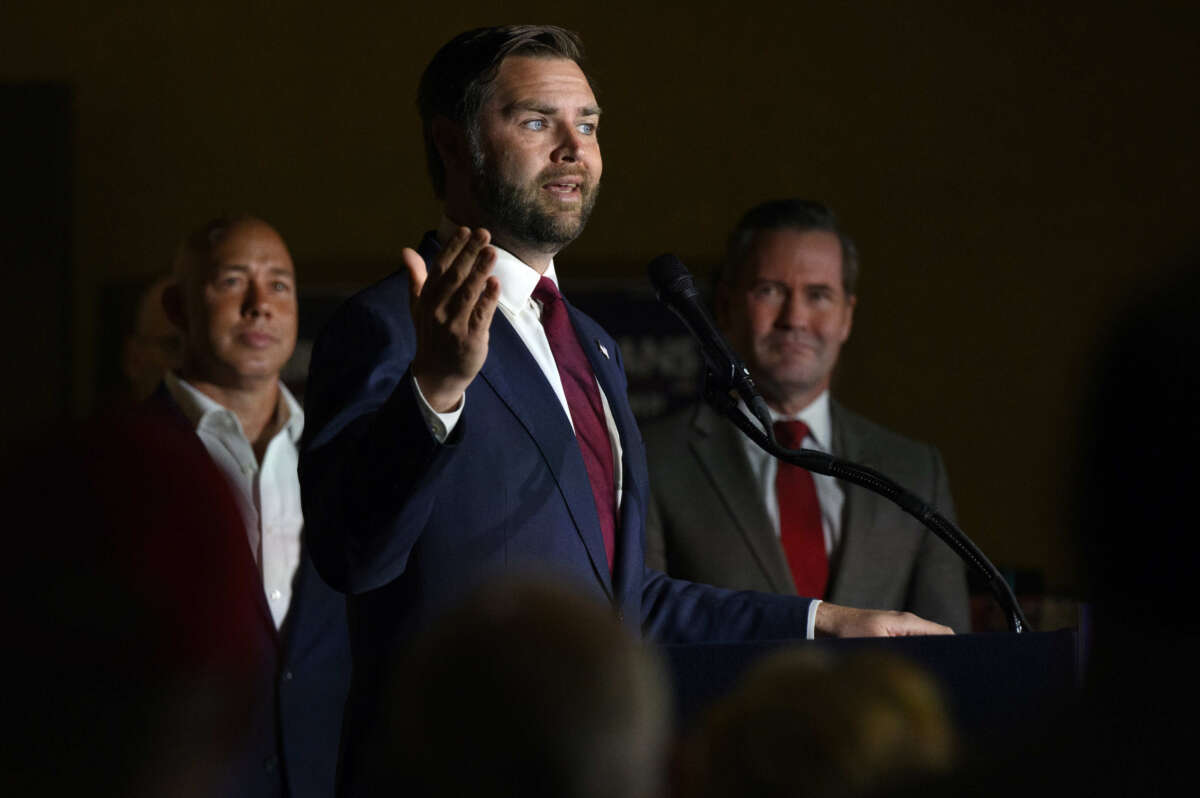Did you know that Truthout is a nonprofit and independently funded by readers like you? If you value what we do, please support our work with a donation.
In an appearance on NBC’s “Meet the Press” program on Sunday, Republican vice presidential nominee Sen. J.D. Vance (R-Ohio) attempted to clarify what his running mate, former President Donald Trump, meant during a debate earlier this month when he said he had a “concept of a plan” regarding the Affordable Care Act (ACA).
Vance’s explanation sought to alleviate fears that the ACA, commonly called Obamacare, would be dismantled should he and Trump win the election. But observers were quick to note that Vance’s description of their plan would essentially upend the program, making it financially unfeasible for the very people it’s supposed to protect.
Trump was pressed during his debate with Democratic candidate for president Kamala Harris on September 10 to explain how he would approach the ACA. Trump had tried (and failed) multiple times to get the law repealed while he was president from 2017 to 2021, though he was successful in weakening it in several ways.
Trump protested that he wouldn’t repeal the law without a plan if he gets elected this year. When asked what that plan would be, he didn’t articulate one, instead telling moderators he had “a concept of a plan,” a statement that was widely ridiculed on social media.
One of the many purposes of the ACA is to prevent insurance companies from using preexisting conditions to bar consumers from care. As many as 129 million Americans could technically be viewed as having a preexisting condition, according to one estimate, though insurers previously had wide leverage in determining what constituted such a condition. Before the ACA was implemented, for example, insurers denied coverage to customers for “conditions” like being pregnant in the past, and even denied care to adults who had required acne medication as teenagers.
On Sunday, Vance claimed that Trump’s “concept of a plan” for the ACA would include “mak[ing] sure preexisting conditions are covered.” But Vance went on to complain that health care exchanges in the ACA put healthy and young people in the same “risk pools” as older and less healthy people, driving up costs for the first group.
“A young American doesn’t have the same health care needs as a 65-year-old American,” Vance said. “A 65-year-old American in good health has much different health care needs than a 65-year-old American with a chronic condition.”
We want to make sure everybody is covered. But the best way to do that is to actually promote some more choice in our health care system and not have a one-size-fits-all approach that puts a lot of people into the same insurance pools, into the same risk pools, that actually makes it harder for people to make the right choices for their families.
Vance’s plan would indeed lower costs for younger and healthier people. But for individuals who are not as healthy or who are older — for whom health care costs can be more costly, and health care needs more frequent — it would raise prices drastically, potentially preventing them from receiving the care they need.
Critics of Vance’s description of Trump’s plan for the ACA pointed out that it would essentially create a situation where insurance companies could reestablish barring care based on preexisting conditions.
The plan would reverse “the regulatory protections in Obamacare that have made the individual markets affordable for people who have preexisting conditions or imperfect health records,” New York Magazine’s Jonathan Chait wrote. “Trump’s concept of a plan would take access to medical care away from millions of Americans.”
“When Vance here says he wants to put the healthy and sick in different risk pools he’s saying he wants to make preexisting conditions protections impossible,” said Brian Beutler, senior editor at The New Republic. “His claim to want to maintain them is a lie.”
“This is what Vance means when he says that people should be able to pick plans that make sense for them, or alludes to ‘risk pools’ — Healthy people get to buy into super cheap insurance [while] sick people get shunted into plans that are unsustainable,” doctor and social media influencer Áine Yore wrote on X.
Press freedom is under attack
As Trump cracks down on political speech, independent media is increasingly necessary.
Truthout produces reporting you won’t see in the mainstream: journalism from the frontlines of global conflict, interviews with grassroots movement leaders, high-quality legal analysis and more.
Our work is possible thanks to reader support. Help Truthout catalyze change and social justice — make a tax-deductible monthly or one-time donation today.
